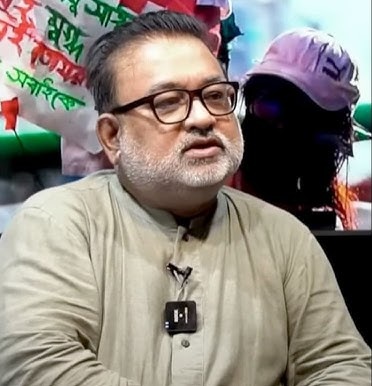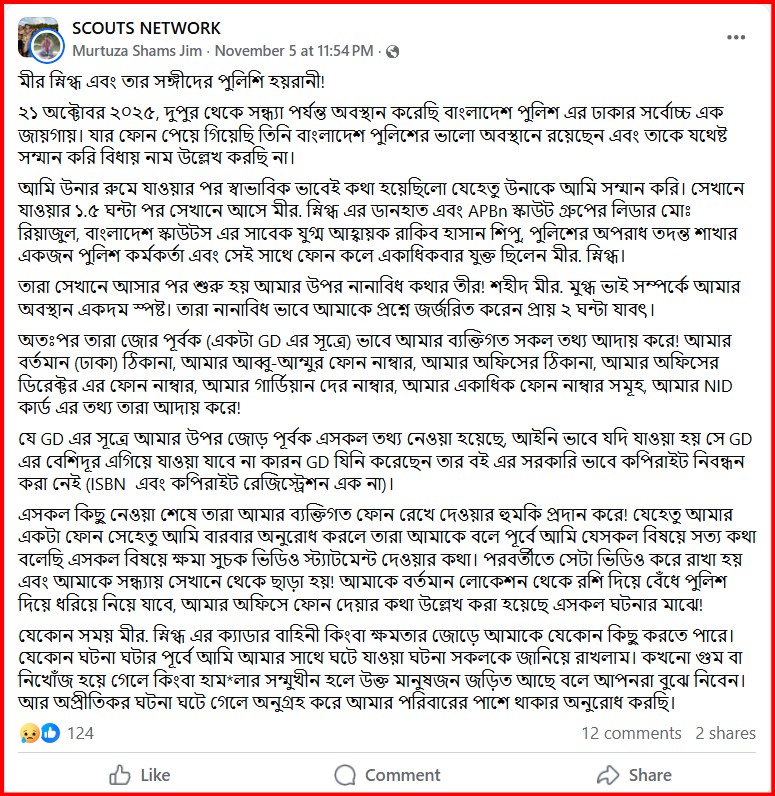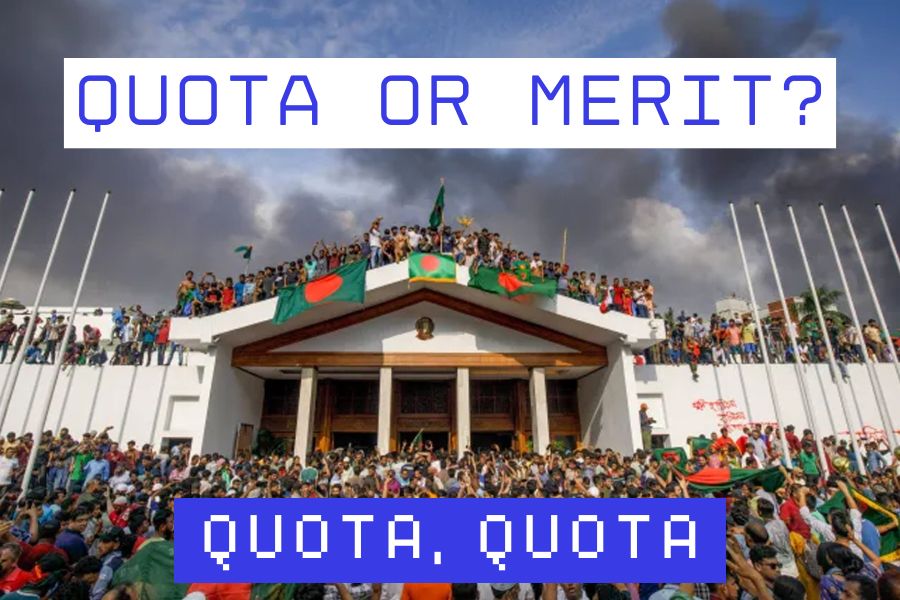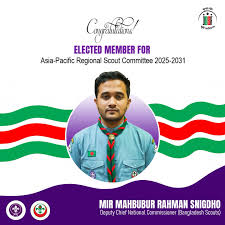In a pointed critique that has ignited fresh debates on equity and legacy in Bangladesh’s political landscape, social media influencer and political observer Dr. Abdun Noor Tushar has challenged the burgeoning “July quota” system, drawing stark parallels to the long-standing reservations for families of 1971 freedom fighters.

Speaking on a lively talk show on Ekushey TV last Thursday, Tushar spotlighted the rapid ascent of Mir Mahbubur Rahman Snigdho—twin brother of the slain “July martyr” Mir Mugdho—whose recent induction into the Bangladesh Nationalist Party (BNP) has fueled speculation about his electoral prospects in a Dhaka constituency.
Tushar’s remarks directly address a contentious issue: the distribution of privileges to the families of those who lost their lives or suffered injuries during the 2024 quota reform uprising. This uprising evolved into a nationwide revolution that overthrew Sheikh Hasina’s government in August.
“If the privileges for the family members of ‘July martyrs and warriors’ are deemed normal and just,” Tushar argued, “then the quota for the descendants of 1971 freedom fighters is equally justified. Why the double standards?”
He zeroed in on 27-year-old Snigdho’s tenure as CEO of the July Shaheed Smriti Foundation, a role he assumed on August 10, 2024, and held until April 2025.

Mir Snigdho left the July Shaheed Smiriti Foundation amid severe criticism against him and another coordinator, Md. Sarjis Alam, for corruption, irregularities, mismanagement, and assaults on victims and their family members. They are accused of embezzling the Tk100 crore fund given by the Chief Adviser’s Relief Fund.
Recently, Mir Snigdho came under severe criticism for abuse of power in the scouts. First, he became the Bangladesh Scouts’ Deputy Chief National Commissioner. He was later chosen to serve on the Asia-Pacific Regional Scout Committee from 2025 to 2031.
Ten July Shaheed Smrity Foundation employees sued
Yunus regime forced to review July martyrs’ list after 52 fake beneficieries exposed
Free flats for injured July protesters as more fake warriors surface
“What qualified him for this high-profile position [at the foundation]—merit, or his brother’s ultimate sacrifice? If posts are handed out on the basis of familial loss, then what fault lies with the freedom fighters’ kin? Why was there such a backlash against their quotas back then? It’s the same logic, repackaged.”
The irony, Tushar noted, is palpable. The very protests that began in June 2024 against the 30% job quota for freedom fighters’ descendants—reinstated by a Supreme Court ruling—escalated into deadly clashes by mid-July, claiming over 800 lives according to official tallies.
The uprising’s success led to the scrapping of most quotas in late July, paving the way for an interim government. Yet, in a swift pivot, a new ecosystem of benefits emerged for “July heroes,” mirroring the very system protesters decried.
“Those whose fathers fell in the Liberation War sought modest benefits and recognition,” Tushar reflected. “If that’s unfair, so is this July quota. If not, then both stand on equal ground.”
Since August 2024, the “July quota” phenomenon has gradually spread throughout Bangladesh’s institutions, beginning at the highest levels of authority and gradually descending.
At the highest level, the interim administration expedited executive appointments, with Snigdho’s CEO position at the July Shaheed Smriti Foundation being just the beginning. By September 2024, circulars from the Public Administration Ministry reserved 5-10% of senior civil service posts for relatives of verified martyrs and injured protesters, ostensibly to honour their “contributions to democracy.”

This policy extended to mid-level bureaucracy; district commissioners in protest-hotbed areas like Dhaka and Chattogram reported allocating advisory roles in local governance to uprising coordinators’ families, often bypassing competitive exams.
The trend deepened in the administrative underbelly by early 2025. Junior cadres in ministries such as Home Affairs and Education saw informal quotas slip in—up to 7% in teacher recruitments and police sub-inspector hires—framed as “reparative justice.”
July Charter: Sheikh Hasina condemns indemnity for ‘killings by July heroes’
July Declaration: Yunus glorifies anti-Bangladesh elements, distorts history
Health sector allocations followed suit: the Ministry of Health issued guidelines in October 2024, granting priority admissions to medical colleges for siblings of the injured, while hospitals reserved beds and subsidised treatments. Even the judiciary was not immune; fast-track courts handling protest-related cases appointed special prosecutors from martyr families, raising concerns about impartiality.
Beyond government, the privileges bleed into other sectors, amplifying the critique. In education, universities like Dhaka University introduced scholarships worth Tk50,000 annually for July warriors’ dependents starting January 2025, alongside waived tuition in private institutions via incentives from the University Grants Commission.
The private sector, under pressure from corporate social responsibility mandates, saw conglomerates like Beximco and PRAN offering internships and entry-level jobs—7% of vacancies in some firms—exclusively for verified families. Banking followed with low-interest loans from state-owned entities, while media outlets provided airtime and column space to “July voices,” blurring lines between commemoration and favouritism. By mid-2025, labour laws even carved out protections for uprising-linked workers in garment factories, the economic backbone of the nation.
Tushar’s intervention comes amid a damning revelation that has eroded public trust in this system: widespread fraud in martyr and injured lists.
Investigations by the Ministry of Liberation War Affairs exposed over 52 fake martyrs among the 834 officially recognised, revealing that their deaths stemmed not from protest violence but from unrelated incidents like land disputes, road accidents, or even suicides.

One notorious case involved a Chattogram man killed in a family brawl on August 7, 2024, retroactively listed as a “July hero” to claim benefits. Hundreds more fake injury claims surfaced: at least 300 entries, per ministry audits, involved fabricated wounds from personal feuds or staged assaults, funnelled through local union parishads via bribes.
These deceptions have spawned ripple effects, including false murder cases. Prosecutors filed over 150 such charges based on bogus martyr narratives, ensnaring innocents in protracted trials and vigilante backlash.
The ministry discarded 24 names initially in January 2025, but probes suggest the tally could climb, with fraud rings allegedly pocketing millions in compensation funds. Civil society groups, including the Anti-Discrimination Students’ Movement alumni, have vandalised foundation offices in protest, demanding forensic audits.
As Snigdho eyes a BNP ticket—potentially leveraging his “quota pedigree” in a polarised election cycle—Tushar’s words resonate beyond the studio. They force a reckoning: In honouring the July uprising’s true sacrifices, has Bangladesh unwittingly replicated the inequities it overthrew? With privileges now entrenched across administration, education, health, and beyond, the nation teeters between gratitude and graft.
Only transparent verification and merit-based reforms, observers say, can salvage the revolution’s promise. For now, the quota debate—1971 or July—rages on, a mirror to unfinished dreams of equality.
Fraudulence, arrogance
Mir Mugdho’s death on the street in Uttara when he was distributing free water bottles among the protesters has been a contentious issue since a video of the shooting went viral on social media.
The video shows that some protesters started running for safety, possibly due to a chase by the police (not visible in the frame). At that time, a bullet hit Mugdho, and he flopped on the road. If it were the police shooting at the protesters, more people around Mugdho would have been shot.
Journalists and researchers suspect that a sniper shot Mugdho.
A day before his death, Mugdho, a student of Bangladesh University of Professionals and a freelancer, criticised the Islami Chhatra Shibir and Chhatra Dal for joining the general students on the streets in disguise. He also posted a Facebook status urging these parties not to politicise the quota reform movement.
Many believe that the Chhatra Shibir decided to kill him because he became an important figure among the protesters in Uttara for his bigger friend circle, amicable behaviour and distributing water bottles with a smile.
Interview With AFP: Sheikh Hasina blames foreign conspiracy for ouster
Interview With Reuters: Sheikh Hasina champions fair, inclusive elections
Sheikh Hasina vows to handcuff Yunus, tie rope around his waist
Meanwhile, Prime Minister Sheikh Hasina has always blamed Muhammad Yunus and his gang for killing students, ordinary people, and police, especially Abu Sayed of Rangpur and Mir Mugdho of Dhaka, to deteriorate law and order and capture power.
Mohibul Hassan Chowdhury Nowfel, the then Education Minister, has alleged that Mir Snigdho is involved with the Hizb ut-Tahrir, which is a militant outfit banned in 2009.
After the changeover, Hizb ut-Tahrir carried out dozens of processions and held human chains in different parts of Dhaka and several other districts with the Kalema flags. They also held a press conference, demanding the withdrawal of the ban.
In an interview with the BBC Bangla, its spokesperson said that they had actively participated in the street protests alongside the students of Dhaka University and other private universities, but without revealing their identities.